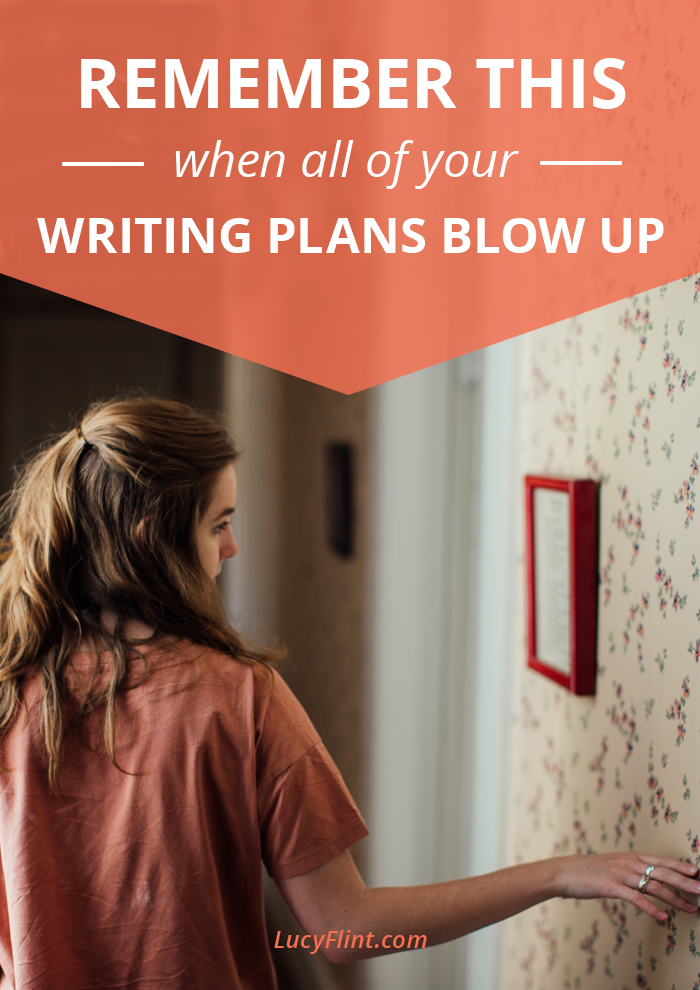Let's Raise Our Glasses: Here's to All the Goals We're NOT Pursuing This Year!
/It's impossible for me not to think about goals during the first month of the year. It's as fun as jumping on the whole back-to-school train in September!
And I'm not the only one who geeks out over these festivals of productivity, right? ;)
Only trouble is, it's incredibly easy for me to go overboard when it comes to New Year's Resolutions. As in: waaaaaaaay overboard.
Y'all know this about me already: Plans and goals go right to my head.
So when January 1 rolls around, I itch to get my hands on some graph paper and just plan the snot out of the next twelve months. I mean... come on. That's what graph paper was invented for!
And this is why I'm so proud of myself right now.
Because I spent some serious time sifting through my priorities and I narrowed my list of would-be goals to three.
JUST THREE. That's like superhuman restraint for me!
Because usually I'll decide that there are, oh, about eight sections of my life that need overhauling, like yesterday, and then I'll brainstorm a dozen goals for each section (just to be safe!). And I'll narrow them down to maybe three or five or eight per section.
And then I'll come up with targets I need to hit to make those goals work, so now I have an army of sub-goals, and before long, they'll have multiplied into more fierce little ambitions than I can count, let alone track, let alone work toward.
But I'll make a massive tracking chart thing anyway, and right at that point all my giddiness will burn out and I'll just sit there choking on overwhelm, staring at my perfect chart.
At which point I'll decide to go binge-watch moody British mysteries until springtime.
Yeah. A hundred percent. That's the usual goal-making process for me, if I'm not very, very careful.
And that's why choosing only three (amazing, exciting, challenging) goals for this year is practically an act of heroism.
I didn't do it alone, though. I had high-quality help in the form of two books: Essentialism, by Greg McKeown, and The Accidental Creative, by Todd Henry (which I fell in love with this fall).
Two super-excellent books for defining what matters in your life as a creative, and then doing it.
The practice of Essentialism is all about focusing on doing less but better. Stripping things down to their essentials and then putting all your energy behind them. (Guess where the name comes from!) After falling head-over-heels for Deep Work and the power of mega-focus, I was ready to dive into Essentialist thinking.
Confession: Left to my own devices, I'm a die-hard Non-essentialist. In McKeown's terms, this means that I'm focusing on "the undisciplined pursuit of more."
In practice, this is a lifestyle of piling on commitments, scattering focus and energy everywhere, and saying yes to everything. And, oh yeah, feeling overwhelmed and like I can't make any progress.
It looks like sitting in front of a big chart of 73 goals with zero energy left to pursue them.
A lifestyle of Essentialism, on the other hand, relies on powerful decisions.
I love how McKeown takes his time with definitions in the book: He points out that the word decision comes out of the Latin for "to cut," or "to kill."
Meaning? When we decide on something, when we choose it, we're killing a different decision. We're cutting ourselves off from a different route. We are actively choosing to NOT do something else.
It's not a "pick both!" situation, even if that's how I try to make it play out. I want to ask, How can I do everything? How can I pick all the things I like? Everything I want, and right now?
But the real, amazing power of a decision comes from the fact that, when you pick one thing, and also pick to NOT do the other thing, you've freed up the resources and time and energy and attention and creativity that would have gone to that second thing.
Which means that your chosen path has gotten a lot stronger. You can do it far better than if you insisted on trying to do more things.
See where we're going with this?
It's worth really wrapping your mind around this. Because if you're like me, it's so easy to believe that we have endless energy, plenty of time, no worries, we don't have to rule anything out!
No matter how many times we prove that that's simply not true.
Anyone with me on this?
It is so much better, more truthful, and less stressful, to take a deep breath and gather the focus to make an actual decision. The kind of decision that cuts something off, that kills the other option.
THIS thing. NOT that thing.
McKeown makes a compelling case, and he totally sold me on Essentialism. And I'm working to mend my scattershot ways!
(There's a lot more to his work than just that, and it's really good! But that's the section I used as I planned my goals. Definitely check out the book for yourself!)
The idea of focusing on only three goals came to me while I was reviewing the notes I took from The Accidental Creative, which is a book about developing a sustainable rhythm to support your creativity. (SO. GOOD.)
One of Todd Henry's concepts is The Big 3, which is just "the three things I need to gain creative traction on right now. They aren't necessarily my biggest projects, though they often are. ... The Big 3 is a constant reminder of where I need to dedicate my creative bandwidth."
For Henry's purposes, the Big 3 can be updated whenever necessary. They can shift from week to week, depending on the progress you make. They're always what you're mulling over, and working to move forward on.
For me, three felt like a magic number. Just enough breadth to dodge boredom, but not so much variety that I lose my grip on what's essential.
I figured: why not have a Big 3 for the year? Aka, my Resolutions??
So I did it. I made a master list of projects and ideas and things that I care about, and then I weeded them out, one by one, until I focused in on my Big Three.
Three super powerful goals. Two are work-related, and the third one is personal. Each of them is a game changer, no wait, a life changer for me.
I made sure they were each fairly clear: measurable, and not just subjective. And then I did all my happy-nerd planning: I looked at where I'd need to be by the end of each month, in order to check off all three by the end of the year.
Each one is a VERY big stretch for me, but at the same time, each one is also truly doable. ... So long as I don't listen to fear, focus on my faults, and spend the year curled up in a corner!
Three mega-exciting goals.
And by not choosing those other seventy ideas, I'm aware of just how huge my attention span is, and how much energy I have, since I'm not spreading it around as much.
What's also surprising is how respected I feel.
These are challenging things that I'm aiming for, but by not adding a dozen more goals on top of them, I feel like Boss-Me is being pretty reasonable toward Working-Me. I'm not thwarting myself from the outset, burying the important goals in a landslide of other attempts and commitments and initiatives.
So: they're actually possible. They will truly happen.
Which is why I seriously can't stop grinning. My heart's beating faster. But I'm not overwhelmed either. Challenged, yes. Overwhelmed? Well, no.
Because I can wrap my mind around each of these three things—there's only three, after all! And I have enough space and resources to seriously make them happen.
One, like I said, is personal. But what are my other two? Well, I definitely and absolutely and no-matter-what-ably am publishing my first book this year.
For SURE.
The date might change, but it is happening, and my current best estimate for publication is July 1. That is what I'm committing my schedule and my focus to.
The other work-related goal is just as big and exciting: I'm committing to sell 1000 copies of that first book in the first six months of publication. WHOA. That's a big, exciting, time-to-put-my-big-girl-pants-on kind of goal!
No chance that I'm going to be bored this year, haha!
... So. Where are you at, my lionhearted friend, with the January goal-making and resolution seeking?
Let me encourage you to pick very few. Just a few goals that are exciting for you, that are extra-important, that are worthy of the bulk of your time and focus and heart.
That would change your world a little—or, oh, even a lot.
(And no, sorry, a dozen goals isn't a few. I get it, and I feel you, but no.)
Challenge yourself to try for just a few big things. Try three. Three is such a great number.
And then feel the rush of empowerment as you line up what you would need to meet that goal.
What kinds of things you would do, in order to make it inescapable that you will hit your goals. Like, no question. Of course they are going to happen. They are definitely going to work out.
And, scary empowering question, what kinds of things will you not do, in order to make each of your goals a reality?
Because it isn't just about setting up a killer action plan. It's about making sure that the time, energy, resources, excitement, and courage are all lined up and available for you from the start.
And then: make the daring, brave commitment to yourself that these things are your Most Important. They are your Essentials, your Big 3.
And if something else comes up, if there are obstacles, if you wake up and stop feeling like it: These goals still win.
That's the power: You're deciding in advance they will happen.
You're calculating the trade-offs in advance. You're invested. You're not chasing after all the other pretty ideas on purpose, so that you have the resources and energy you need.
Focusing on these things is worth it.
So what are your Big 3? What's on your plate this year?
What is going to consistently win your focus and excitement, week after week this year, until it's done?
Ooooh. That's the kind of amazing attitude and bold commitment that's gonna get things done.
Want more resources? If you eat this kind of stuff up, definitely check out the book The One Thing, because it's also really helpful with questions of focus and purpose and what's essential.
Also, there's my new favorite podcast (!!!!!), which is The Life Coach School Podcast, by Brooke Castillo. Seriously, y'all, the more I listen to it, the more I am CONVINCED that it is essential listening for every writer who is trying to publish and sell her work. For everyone who has to manage their own thoughts and goals and emotions and attitude: it is a MUST LISTEN. It just gives you such incredible tools for motivating yourself!
Definitely check out her episode on goal making, her episode on self doubt, and her episode on what you want to create in your life. They will rock your world, and get you thinking of how to tackle huge wonderful things in your life!!
Buckle up, 2017!














